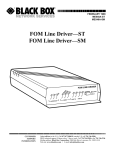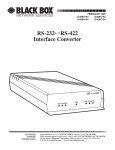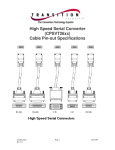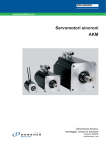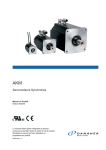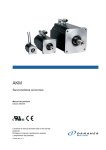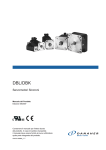Download Black Box V.35RS-422 User's Manual
Transcript
NOVEMBER 1995 IC483A IC483AE IC483C IC481A-R2 IC481C-R2 V.35↔RS-422 Interface Converter CUSTOMER SUPPORT INFORMATION Order toll-free in the U.S.: Call 877-877-BBOX (outside U.S. call 724-746-5500) FREE technical support 24 hours a day, 7 days a week: Call 724-746-5500 or fax 724-746-0746 Mailing address: Black Box Corporation, 1000 Park Drive, Lawrence, PA 15055-1018 Web site: www.blackbox.com • E-mail: [email protected] FEDERAL COMMUNICATIONS COMMISSION AND CANADIAN DEPARTMENT OF COMMUNICATIONS RADIO FREQUENCY INTERFERENCE STATEMENTS This equipment generates, uses, and can radiate radio frequency energy and if not installed and used properly, that is, in strict accordance with the manufacturer’s instructions, may cause interference to radio communication. It has been tested and found to comply with the limits for a Class A computing device in accordance with the specifications in Subpart J of Part 15 of FCC rules, which are designed to provide reasonable protection against such interference when the equipment is operated in a commercial environment. Operation of this equipment in a residential area is likely to cause interference, in which case the user at his own expense will be required to take whatever measures may be necessary to correct the interference. Changes or modifications not expressly approved by the party responsible for compliance could void the user’s authority to operate the equipment. This digital apparatus does not exceed the Class A limits for radio noise emission from digital apparatus set out in the Radio Interference Regulation of the Canadian Department of Communications. Le présent appareil numérique n’émet pas de bruits radioélectriques dépassant les limites applicables aux appareils numériques de classe A prescrites dans le Règlement sur le brouillage radioélectrique publié par le ministère des Communications du Canada. INSTRUCCIONES DE SEGURIDAD (Normas Oficiales Mexicanas Electrical Safety Statement) 1. Todas las instrucciones de seguridad y operación deberán ser leídas antes de que el aparato eléctrico sea operado. 2. Las instrucciones de seguridad y operación deberán ser guardadas para referencia futura. 3. Todas las advertencias en el aparato eléctrico y en sus instrucciones de operación deben ser respetadas. 4. Todas las instrucciones de operación y uso deben ser seguidas. 5. El aparato eléctrico no deberá ser usado cerca del agua—por ejemplo, cerca de la tina de baño, lavabo, sótano mojado o cerca de una alberca, etc.. 6. El aparato eléctrico debe ser usado únicamente con carritos o pedestales que sean recomendados por el fabricante. 7. El aparato eléctrico debe ser montado a la pared o al techo sólo como sea recomendado por el fabricante. 8. Servicio—El usuario no debe intentar dar servicio al equipo eléctrico más allá a lo descrito en las instrucciones de operación. Todo otro servicio deberá ser referido a personal de servicio calificado. 9. El aparato eléctrico debe ser situado de tal manera que su posición no interfiera su uso. La colocación del aparato eléctrico sobre una cama, sofá, alfombra o superficie similar puede bloquea la ventilación, no se debe colocar en libreros o gabinetes que impidan el flujo de aire por los orificios de ventilación. 10. El equipo eléctrico deber ser situado fuera del alcance de fuentes de calor como radiadores, registros de calor, estufas u otros aparatos (incluyendo amplificadores) que producen calor. 11. El aparato eléctrico deberá ser connectado a una fuente de poder sólo del tipo descrito en el instructivo de operación, o como se indique en el aparato. 12. Precaución debe ser tomada de tal manera que la tierra fisica y la polarización del equipo no sea eliminada. 13. Los cables de la fuente de poder deben ser guiados de tal manera que no sean pisados ni pellizcados por objetos colocados sobre o contra ellos, poniendo particular atención a los contactos y receptáculos donde salen del aparato. 14. El equipo eléctrico debe ser limpiado únicamente de acuerdo a las recomendaciones del fabricante. 15. En caso de existir, una antena externa deberá ser localizada lejos de las lineas de energia. 16. El cable de corriente deberá ser desconectado del cuando el equipo no sea usado por un largo periodo de tiempo. 17. Cuidado debe ser tomado de tal manera que objectos liquidos no sean derramados sobre la cubierta u orificios de ventilación. 18. Servicio por personal calificado deberá ser provisto cuando: A: El cable de poder o el contacto ha sido dañado; u B: Objectos han caído o líquido ha sido derramado dentro del aparato; o C: El aparato ha sido expuesto a la lluvia; o D: El aparato parece no operar normalmente o muestra un cambio en su desempeño; o E: El aparato ha sido tirado o su cubierta ha sido dañada. V.35↔RS-422 INTERFACE CONVERTER TRADEMARKS USED IN THIS MANUAL Any trademarks mentioned in this manual are acknowledged to be the property of the trademark owners CONTENTS Contents Chapter Page 1. SPECIFICATIONS ......................................................................................................................................4 2. INTRODUCTION ......................................................................................................................................5 3. INSTALLATION.........................................................................................................................................6 3.1 DIP Shunt Settings........................................................................................................................6 3.2 LEDs ..............................................................................................................................................8 4. GROUND STRAP AND PIN CONNECTIONS ........................................................................................9 4.1 Ground Strap ................................................................................................................................9 4.2 Pin Connections..........................................................................................................................10 3 V.35↔RS422 INTERFACE CONVERTER 1. Specifications Speed — Up to 2.5 Mbps Maximum Transmission Rate — Approximately 2.455 Mbps Interface — RS-422, V.35 Connectors — IC481A-R2: RS-422: (1) DB37 female (pinned to RS-449 specifications); V.35: (1) male 34-pin “M” block IC483A: RS-422: (1) DB37 female (pinned to RS-449 specifications); V.35: (1) female 34-pin “M” block Controls — Jumpers for Pin H Support V.35 port DTE/DCE jumper-selectable RS-422 port DTE/DCE jumper-selectable Maximum Storage Temperature — 158°F (70°C) Maximum Operating Temperature — 122°F (50°C) Power — IC481A-R2, IC483A: 115-VAC, 60-Hz, 16-watt power supply; IC483AE: 230-VAC, 50 Hz, 16-watt power supply; IC481C-R2, IC483C: Requires 16 watts from RM060 interface Size — Standalone: 2.3"H x 8"W x 11.9"D (5.8 x 20.3 x 30.2 cm) Rackmount Card: 7.5"W x 10.5"D (19.1 x 26.7 cm) Weight — 2 lb. (0.9 kg) 4 CHAPTER 2: Introduction 2. Introduction The V.35↔RS-422 Interface Converter comes in both 115-VAC (IC483A) and 230-VAC (IC483AE) standalone units. A card version (IC483C) is available for rackmounting. The rack (RM060) is switch-selectable for either 115-VAC or 230-VAC operation. The V.35↔RS-422 Interface Converter provides bidirectional conversion of all the commonly used V.35 and RS-422 signals. The unit operates with one port configured as Data Terminal Equipment (DTE) and the other port configured as Data Communications Equipment (DCE). The unit has two jumper-selectable configurations. One connects RS-422 modem equipment to V.35 terminal equipment (DCE to DTE). The other connects V.35 modem equipment to RS-422 terminal equipment (DTE to DCE). Both configurations allow bidirectional data transfer. Typical applications are shown in Figure 2-1. NOTE The Converter is configured opposite of the equipment you are connecting. RS-422/V.35 RS-422 MODEM (DCE) DTE DCE V.35 TERMINAL COMPUTER (DTE) RS-422/V.35 RS-422 TERMINAL COMPUTER (DTE) DCE DTE V.35 MODEM DSU (DCE) Figure 2-1. Typical Applications of the RS-422<—>V.35 Interface Converter. 5 V.35↔RS422 INTERFACE CONVERTER 3. Installation 3.1 DIP Shunt Settings The V.35↔RS-422 Interface Converter has two jumper selectable configurations determined by DIP shunt settings located inside the unit on the printed circuit board. One configuration is for connecting RS-422 DTE to V.35 DCE. The second configuration is for connecting V.35 DTE to RS-422 DCE. See Figure 3-1 for more information on DIP Shunt settings. DTE DCE A B V.35 DTE STEP 1 XW5 V.35 CONNECTOR STEP 2 XW6 XW4 W1 A B C XW3 RS-422 CONNECTOR STEP 4 XW2 W2 A B C STEP 3 XW1 If V.35 is DTE OR DTE DCE A B XW6 STEP 1 XW5 STEP 2 422 DTE XW4 V.35 CONNECTOR FACTORY DEFAULT SETTING W1 A B C XW3 RS-422 CONNECTOR STEP 4 W2 STEP 3 A B C XW2 XW1 If RS232 is DTE STEP 4 Pin H Supported (As shipped) W1 in BC Position (DTR passed from V.35 to RS-422 port) W2 in AB Position OR Pin H Not Supported W1 in AB position W2 in BC Position Figure 3-1. Quick Setup Guide for DIP Shunt Settings. 6 CHAPTER 3: Installation To install the V.35↔RS-422 Interface Converter, follow these steps and refer to Figures 3-1 and 3-2. 1. Set jumper XW6 to V.35 side when configuring the V.35 side of the unit as DTE. Set XW6 to the 422 side when configuring the RS422 side of the unit as DTE. Jumper XW6 affects only the front panel LEDs. 2 & 3. When configuring V.35 as DTE and RS-422 as DCE, set jumpers in sockets labeled XW1B, XW2B, XW3B, XW4A, and XW5A. When configuring V.35 as DCE and RS-422 as DTE, set jumpers XW1A, XW2A, XW3A, XW4B, and XW5B. 4. Jumper W1 is used if the V.35 side of the Converter is DCE. If W1 is in the B-C position, the DTR signal (pin H) is passed from the V.35 port through to pins 12 and 30 of the RS-422 port. If W1 is placed in the A-B position, pins 12 and 30 are forced high. When the V.35 side is configured as DTE, W1 has no effect and W2 is used instead. With W2 in the A-B position, the terminal ready (DTR) signal is passed from the RS-422 side of the V.35 port. With W2 in the B-C position, Pin H is forced high. 5. Attach the cable from the RS-422 device to the 37-pin female receptacle (J1) on the rear panel of the V.35↔RS-422 Interface Converter. 6. Attach the cable from the V.35 device to the 34-pin female M-block connector (J2) on the rear panel of the V,35↔RS-422 Interface Converter. W2 XW6 W1 DTE DCE RX J2 J1 V. 3 5 RS 4 4 9 7. Plug the 4-pin power cord into the receptacle on the rear panel of the case. Do not plug the power module into an AC outlet yet. After the DIP shunts are set as explained in Section 3.1, plug the power module into an AC outlet. The unit is now ready to use. Figure 3-2. Board Layout Showing LED Indicators and Plug Connectors. 7 V.35↔RS422 INTERFACE CONVERTER 3.2 LEDs The V.35↔RS-422 Interface Converter is equipped with ten LED indicators located on the front panel. The row of type above the LEDs indicates the uses of the LEDs for a RS422 DTE/V.35 DCE configuration. The row of type below the LEDs indicates the uses of the LEDs for a V.35DTE/RS422 DCE configuration. Refer to Figure 3-3. In the card version, the LED’s distinction is on the pull lever. Figure 3-3. Front Panel LEDs. 8 CHAPTER 4: Ground Strap and Pin Connections 4. Ground Strap and Pin Connections 4.1 Ground Strap Signal grounds (Pins 19, 20, and 37 on the 422 interface and Pin B on the V.35 interface) are connected together, but not connected to chassis ground (Pin A). However, for applications requiring the grounds at a common reference point, the grounds can be connected by installing a jumper strap across W3 located at the rear of the printed circuit board between J1 and P1. CHASSIS GROUND REQUEST TO SEND DATA SET READY DATA TERMINAL READY TEST MODE A C E H K B D F J L SIGNAL GROUND CLEAR TO SEND RECEIVE LINE SIGNAL DETECT LOCAL LOOPBACK TEST PATTERN TRANSMITTED DATA P TRANSMITTED DATA S TRANSMIT TIMING U TRANSMIT TIMING W TRANSMIT TIMING Y TRANSMIT TIMING AA AA REMOTE LOOPBACK R T V X RECEIVED DATA RECEIVED DATA RECEIVE TIMING RECEIVE TIMING BB REMOTE LOOPBACK Figure 4-1. V.35 Interface RECEIVE COMMON 20 21 SEND DATA 22 SEND TIMING 23 RECEIVE DATA 24 REQUEST TO SEND 25 RECEIVE TIMING 26 CLEAR TO SEND 27 28 DATA MODE 29 TERMINAL READY 30 RECEIVER READY 31 32 33 34 TERMINAL TIMING 35 36 SEND COMMON 37 1 2 3 4 5 6 7 8 9 10 11 12 13 14 15 16 17 18 19 SHIELD SEND DATA SEND TIMING RECEIVE DATA REQUEST TO SEND RECEIVE TIMING CLEAR TO SEND DATA MODE TERMINAL READY RECEIVER READY TERMINAL TIMING SIGNAL GROUND Figure 4-2. RS-422 Interface. 9 V.35↔RS422 INTERFACE CONVERTER 4.2 Pin Connections Figures 4-1 and 4-2 show the pin connections for the V.35↔RS-422 Interface Converter. The illuminated LEDs in these figures indicate incoming signals only. The unit is shipped without the jumper (Rx) between signal ground and chassis ground. The RS-422 port is configured DTE and the V.35 port is configured DCE. For operation with the RS422 port as DCE and the V.35 port as DTE, the signal directions are reversed1. Pins 12 and 30 of the RS422 port become inputs which are connected to a status LED. 1 In this configuration, W1 has no effect on the circuit W2 is used instead. W2 A Pin 30 B Pin H Pin 12 C The unit is shipped with the TERMINAL READY jumper in the TRUE (ON) position. AB - DTR passed through BC - DTR always asserted 10 CHAPTER 4: Ground Strap and Pin Connections 4 22 4 22 P S P S DS5 DS6 TD 6 24 R T R T DS6 DS5 C C DS3 DS1 D D DS1 DS3 E E DS9 13 31 DS4 DS2 F DS4 RR Y AA DS8 V X V X DS7 12 DS7 RC 17 35 12 30 CTS DS1 DS2 RTS RR DS3 DS4 30 U W C A DS10 TC 8 26 TC 8 26 SD 5 23 Y AA DS8 DSR 13 31 DTR/DM F 5 23 CTS 11 29 CTS 11 29 RTS 9 27 RTS 9 27 RD 7 25 RD 7 25 TD 6 24 RC A B W2 H C C H B W1 DS9 TD RD RC TC DM DS5 DS6 DS7 DS8 DS9 POWER Figure 4-1. The Converter Configured for RS-422 as DTE and V.35 as DCE. DM/DTR 17 35 U W DS1 DS2 DS3 DS4 DS10 DS5 DS6 DS7 DS8 DS9 RTS DSR CTS SD POWER RD TD RC TC DTR Figure 4-2. The Converter Configured for RS-422 as DCE and V.35 as DTE. 11 © Copyright 1995. Black Box Corporation. All rights reserved. 1000 Park Drive • Lawrence, PA 15055-1018 • 724-746-5500 • Fax 724-746-0746
This document in other languages
- español: Black Box V.35RS-422














